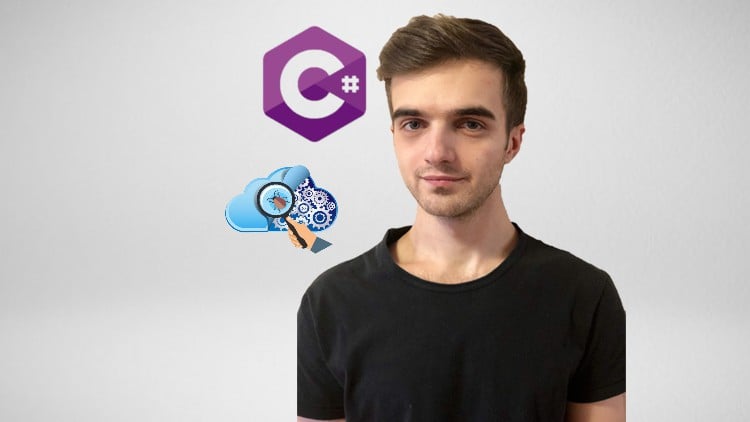
4 coureses in 1! Practical guide to become a Professional QA Automation Engineer in C#/.NET (AQA)
⏱️ Length: 20.9 total hours
⭐ 4.38/5 rating
👥 31,826 students
🔄 August 2024 update
Add-On Information:
Note➛ Make sure your 𝐔𝐝𝐞𝐦𝐲 cart has only this course you're going to enroll it now, Remove all other courses from the 𝐔𝐝𝐞𝐦𝐲 cart before Enrolling!
-
Course Overview
- This intensive curriculum is meticulously designed for individuals aspiring to become proficient C# Test Automation Engineers, guiding learners from foundational concepts to advanced, professional-grade techniques. It encapsulates the equivalent of four distinct courses in one, offering a holistic and accelerated pathway to master the nuances of Automated Quality Assurance (AQA) within the robust .NET ecosystem.
- Emphasizing a truly practical, hands-on approach, this program is built around real-world application, ensuring that participants don’t just grasp theoretical knowledge but also develop the critical problem-solving skills essential for creating impactful and efficient automation solutions. The “Zero to Hero” promise underscores its comprehensive nature, catering to absolute beginners while elevating them to expert practitioners capable of tackling complex automation challenges.
- With a substantial update in August 2024, the course content remains cutting-edge and relevant, reflecting the latest industry standards and best practices in C# automation. This commitment to ongoing relevance ensures that graduates are equipped with current knowledge, making them highly competitive in the rapidly evolving software testing landscape and adept at future industry shifts.
- The course is framed as a foundational journey into the realm of professional AQA, leveraging the power and versatility of C#.NET. It aims to instill not just tool proficiency but a deep understanding of the architectural principles behind effective and maintainable test automation frameworks, crucial for long-term career success and sustainable quality initiatives within an organization.
-
Requirements / Prerequisites
- While no prior extensive experience in C# programming is strictly necessary, a basic understanding of general programming logic and concepts, such as variables, loops, and conditional statements, will be highly beneficial. The course is structured to guide learners through the specifics of C# from the ground up, making it accessible even for those new to the language.
- Participants should possess a working computer with a stable internet connection, capable of running modern development environments and browsers. A genuine eagerness to learn, a disciplined approach to practical exercises, and a commitment to completing assignments are far more critical than an advanced technical background.
- A keen eye for detail, a logical mindset, and an analytical approach are highly advantageous, as these qualities are fundamental to identifying potential software defects, designing effective and comprehensive test cases, and ensuring the overall quality of software products. This course will cultivate a methodical approach to problem-solving within a testing context.
-
Skills Covered / Tools Used
- Master the principles of designing and implementing sophisticated test automation framework architectures, including strategies for modularity, reusability, and maintainability. This involves understanding how to structure test projects effectively to handle growing complexity and facilitate collaborative development, moving beyond simple linear scripts.
- Gain expertise in advanced debugging methodologies and systematic troubleshooting techniques specific to automation scripts, allowing you to quickly pinpoint and resolve complex issues. This extends to understanding stack traces, utilizing an Integrated Development Environment (IDE) efficiently for code inspection, and implementing robust error handling.
- Develop comprehensive skills in test data management, exploring various techniques for externalizing, generating, and utilizing diverse data sets to achieve thorough test coverage. This includes strategies for parameterizing tests and ensuring data integrity across multiple testing environments and scenarios.
- Learn how to integrate automated tests seamlessly into the Continuous Integration/Continuous Delivery (CI/CD) pipeline, understanding the role of version control systems, automated build processes, and effective reporting mechanisms for a modern Software Development Life Cycle (SDLC).
- Acquire a strong command over advanced techniques for interacting with dynamic and asynchronous web elements, ensuring the reliability and stability of test execution across varying application states, network conditions, and UI transitions, without relying on fragile or inefficient synchronization methods.
- Explore the creation of insightful and actionable test execution reports, enabling effective communication of test results to stakeholders, facilitating defect tracking, and driving data-informed decisions for continuous quality improvement throughout the development process.
-
Benefits / Outcomes
- Upon completion, graduates will be equipped with the practical expertise to confidently design, develop, and maintain sophisticated test automation frameworks from scratch, ready to contribute significantly to any software development team. This goes beyond mere scripting to a full-fledged architectural understanding.
- This program instills a professional mindset, enabling you to not only automate tests but also to actively participate in the broader Quality Assurance strategy, identifying areas for improvement, implementing best practices, and driving quality within the development lifecycle. You’ll become a valuable asset in ensuring robust software delivery.
- You will develop a compelling portfolio of practical projects and a deep understanding of an automation engineer’s daily responsibilities, significantly boosting your employability and providing tangible evidence of your skills during job interviews. The structured guidance ensures a solid foundation for accelerated career advancement.
-
PROS
- Comprehensive “Zero to Hero” Pathway: Offers an incredibly thorough and structured learning path suitable for absolute beginners aiming for professional expertise, eliminating the need for multiple disparate courses and providing a singular, cohesive learning journey.
- Mentor-Driven Learning Experience: The explicit mention of learning from the tutor’s source code and completing homework with the trainer provides a unique, highly supportive, and practical mentorship-like environment that fosters deep understanding and real-world skill development.
- Career-Oriented and Industry-Relevant: Focuses on practical application, adopting best practices, and writing clean, maintainable code, directly preparing students for highly sought-after roles as professional QA Automation Engineers with up-to-date and valuable skills.
-
CONS
- Significant Time and Resource Commitment: While comprehensive, the “4 courses in 1” nature and depth of content demand a substantial investment of time and consistent effort, potentially overwhelming for individuals seeking a quicker, superficial overview of test automation.
Learning Tracks: English,Development,Software Testing
Found It Free? Share It Fast!